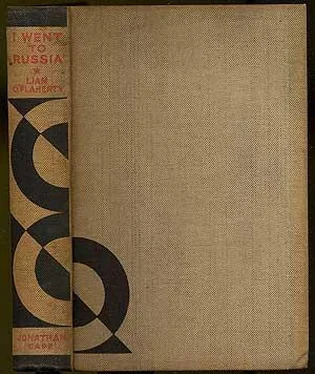Liam O'Flaherty - I Went to Russia
Здесь есть возможность читать онлайн «Liam O'Flaherty - I Went to Russia» весь текст электронной книги совершенно бесплатно (целиком полную версию без сокращений). В некоторых случаях можно слушать аудио, скачать через торрент в формате fb2 и присутствует краткое содержание. Город: London, Год выпуска: 2011, ISBN: 2011, Издательство: Bloomsbury Publishing, Жанр: Публицистика, на английском языке. Описание произведения, (предисловие) а так же отзывы посетителей доступны на портале библиотеки ЛибКат.
- Название:I Went to Russia
- Автор:
- Издательство:Bloomsbury Publishing
- Жанр:
- Год:2011
- Город:London
- ISBN:9781448205592
- Рейтинг книги:5 / 5. Голосов: 1
-
Избранное:Добавить в избранное
- Отзывы:
-
Ваша оценка:
- 100
- 1
- 2
- 3
- 4
- 5
I Went to Russia: краткое содержание, описание и аннотация
Предлагаем к чтению аннотацию, описание, краткое содержание или предисловие (зависит от того, что написал сам автор книги «I Went to Russia»). Если вы не нашли необходимую информацию о книге — напишите в комментариях, мы постараемся отыскать её.
I Went to Russia — читать онлайн бесплатно полную книгу (весь текст) целиком
Ниже представлен текст книги, разбитый по страницам. Система сохранения места последней прочитанной страницы, позволяет с удобством читать онлайн бесплатно книгу «I Went to Russia», без необходимости каждый раз заново искать на чём Вы остановились. Поставьте закладку, и сможете в любой момент перейти на страницу, на которой закончили чтение.
Интервал:
Закладка:
‘Tell me,’ said comrade Levit suddenly, ‘the exact meaning of the word piobrach and whether it is an Irish or a Scotch word?’
It means piping,’ I said, ‘from piob, meaning pipe, a musical instrument popular among the Irish Gaels. It is an Irish word and not a Scotch word, as there is no such thing as a Scotch word properly speaking, except such local corruptions of the Irish and English languages as have come to be regarded as a Scottish dialect. Northern Scotland was conquered and colonised by the Irish Gaels and given the Irish language. The difference between Irish and Scotch is merely the difference between proper English, as spoken in England and American English, as spoken by Americans. Even though the difference between proper English and American is large, it is not yet sufficiently great to allow the Americans the honour of having created a new language. And in any case, English must always remain the property of the English. It could never become the property of the Americans. Neither could Irish become the property of the Scotch.’
I shall take that down,’ said comrade Levit, excitedly. It is an extremely important statement. For the situation is such. I am now engaged in a violent struggle with another comrade, a great scoundrel, who also specialises in English literature. He is such a man. A great fool. He makes such mistakes. He claims that Peacock was a greater novelist than Defoe. This I will admit. Peacock is greater than the Defoe of Robinson Crusoe. But the Defoe of Moll Flanders is a writer of monstrous size, while Peacock is only, so to speak, entertaining and on a level with such men as Meredith. And he also makes such mistakes. He translates the name Gertrude Atherton into Russian as if the a in Atherton were pronounced short as in bad, instead of long as in the exclamation eh. It is a foolish error and shows great ignorance. I shall at once write an article on the word piobrach.’
During the remainder of the evening, I was unable to get as much information from him about Russian intellectuals and their position in the new society as I wished, for I had unfortunately stirred into activity the chief enthusiasm of his life. But he amazed me by his knowledge of books, writers, and in fact of everything to be found in museums, libraries, art galleries all over the world. Although he had never set foot in England, indeed he had never left Russia, he knew the British Museum almost as well as Richard GarneIt must have known its library. The most obscure English writers were familiar to him. At one moment he discoursed on the origin of the Limerick. At the next he became enthusiastic over the researches of Dr. McNeill into ancient Irish sagas. Now and again, he pulled himself together and tried to relate his enthusiasm for scholarship to the Five Year Plan and the industrialisation of the Soviet Union, but he soon relapsed.
It is terrible,’ he cried once, waving his arms in despair, ‘the housing crisis. Now I can hardly enter my room because of my books and it is impossible to get a second room. Because of my books I have to lead the life of a bachelor, being married only one night every week. At first I was a married man, but three wives, one after the other, all refused to share my love for these invaluable possessions, which are books. Therefore, I now am a bachelor except one night every week, I marry in order to liquidate these congestions of the human body.’
In the intervals of discoursing on his pet subjects, he showed me the Press Club and later The House of Hertzen, which has been given by the government to writers as a club. This is the house that figured in War and Peace, as the home of Count Rostov. It was, in fact, the residence of a Polish nobleman, living in Russia, and the man’s coat-of-arms still stands over the door. It has been largely rebuilt, but the exterior still remains exactly what it was in Tolstoy’s time, with the difference that the stables are in ruins and the great courtyard in a state of great disorder. I was also amused to see the old stairway. It would be impossible to find as mean a staircase in a London tenement house. I could only come to the conclusion, from looking at it and mounting it, that the Russian aristocracy in the nineteenth century was much more primitive than Russian writers cared to admit.
But the present proprietors of the house struck me as even more peculiar in their habits and ideas than the most insane Russian aristocrats of the old regime. There are in England and America (especially in the latter country) ridiculous institutions for the manufacture of writers, schools of journalism and courses in dramatic art and such things. But even the wildest insanities born of the American love of mass production and of standardisation could not equal the Russian insanity as explained to me proudly by comrade Levit.
As we went from one room to another, he explained the purpose of each room in a few words, interrupting for a moment his more important remarks on Western European culture.
‘This room,’ he would say, ‘is such a place. Here there is always silence or only whispers. You see it is arranged in such a way. It is large. The colours sombre. The woodwork is smooth and not adorned. All is straight lines and there are no curves, which leads to romanticism and mysticism. Straight lines produce realism. Through the windows may be seen various tall buildings, also in straight lines, factories and such useful social structures, to give the impression of social creative energy. Indeed from this room one may see many buildings of the Five Year Plan. Therefore in this room writing is done by young writers who are learning to write. Older writers who are already qualified as Soviet writers give them assistance and instruction in the proper social attitude and the art of writing. The situation is such. At present there are no writers at work, because this is the scheduled time for social recreation. In another room I shall show you this.’
In another room he showed me a large chart on the wall and explained its meaning. There were statistics of the number of writers in the Soviet Union, divided into males and females and further divided into various categories, poets, novelists, dramatists and journalists. But a much more interesting item was the schedule for the daily-routine of a writer at work. The writer must arise at seven-thirty. He must spend twenty-five minutes at physical exercises. Then he must meditate for half an hour on his work for the day. Then he has breakfast, which takes half an hour. Then he lounges for an hour over a cigarette or two, making further reflections. Then he works for two hours. Then he walks or takes some other exercise for an hour. Afterwards there were three hours spent in conversation, a further three hours spent in working and some time for social duties. I cannot remember the whole routine correctly, but it aroused horror in me.
‘This,’ cried comrade Levit, cis part of the scheme for the liquidation of anarchy in literary production. It is a war on bohemianism and individualism. The situation is such within the Soviet Union and it is much better than in Western Europe. When one thinks how such a great writer as Baudelaire was ruined by the lack of such discipline it is sad.’
‘But is it a success?’ I asked. ‘Do all writers submit to this discipline?’
He paused for a moment and then said:
I hope so. Indeed I hope so. But the situation is such. Our generation is still infected with the poison of our bourgeois upbringing. The next generation shall be organised in such a manner. Then individualism shall finally disappear.’
‘But where did this idea come from? Did it originate with the writers themselves or did the government impose it on the writers?’
‘Comrade,’ he cried, ‘please understand that such a situation cannot exist that the government interferes with the freedom of writers. The writers themselves govern this building and all it contains through the Federation of Writers, which is a trade union and a member of the Russian Federation of Trade Unions, like all other worker organisations. Of course, members of the Party are on the committee, but then members of the Party are on all such committees.’
Читать дальшеИнтервал:
Закладка:
Похожие книги на «I Went to Russia»
Представляем Вашему вниманию похожие книги на «I Went to Russia» списком для выбора. Мы отобрали схожую по названию и смыслу литературу в надежде предоставить читателям больше вариантов отыскать новые, интересные, ещё непрочитанные произведения.
Обсуждение, отзывы о книге «I Went to Russia» и просто собственные мнения читателей. Оставьте ваши комментарии, напишите, что Вы думаете о произведении, его смысле или главных героях. Укажите что конкретно понравилось, а что нет, и почему Вы так считаете.












